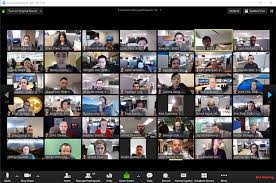Meetings Are Not (Always) the Answer

In the coaching sessions I've conducted this week, a theme has emerged. In our new work-from-home reality, people are being asked to join meetings all. day. long. Whether this is an honest bid for connection or a new form of micromanagement, professionals at all levels are dealing with 8 - 10 hour days in front of their computer, often on Zoom or Skype sessions. One manager shared with me recently, "I had 10 meetings yesterday. The last one finished after 5pm - and then I had 4+ hours of work to do as a result of those meetings. This is not sustainable!" Emotions are running high and sitting through long (and frequent) meetings is not helping to alleviate mental conditions that prevent us from focusing and getting work done in a productive way.
Over and over, I hear how stressed people are, how their backs hurt from sitting so long, how hard it is to keep their kids busy while they work, and all the while, worrying that they might get laid off or get sick. So what can be done? You're in the same boat AND you've been charged with keeping your team productive and on track - how can you do that when you're not physically together?
- Be curious about the emotions that drive the need for meetings. If you are scheduling meetings to quell your own anxiety, you might be better served to find other ways to regulate your emotions. Talking to a mentor or friend, creating a prioritization list or taking a few conscious breaths are all proven techniques that can calm your mind. If you've been asked to attend meetings that are driven by fear in some way, consider talking to the meeting organizer to reconfigure the agenda to be more productive. Look for opportunities to consolidate meetings on the same topic and allow stakeholders to address their fears as part of the process of solving for better outcomes.
- Apply good meeting management techniques. A well-run meeting keeps everybody calm and focused, and can do wonders for morale. Publish an agenda ahead of time and keep the meetings as short as possible. Consider cutting hour-long meetings to thirty minutes. If everyone understands the goal of the meeting beforehand, it's likely that outcomes can be achieved in less time. Before you schedule, ask yourself, "Can the issue we are meeting about be resolved another way?" If so, by all means, try that first!
- Identify alternate ways of checking work progress. If you are using meetings as a way of checking up on the productivity of your team, chances are you're wasting precious time and adding to the emotional burden of your employees. Use Slack channels, instant messaging apps, or other internal portals to communicate and check status.
- When the purpose is to connect, make it really count. Your team really needs to hear from you and know that you care right now. You'll need to set a predictable cadence of 1:1 and team meetings so that your team can count on regular times they will have access to you. This can also prevent reactionary and unnecessary one-off meetings that can clog your own calendar. If you suspect that your employees are overwhelmed and experiencing emotions like anxiety, worry or frustration, ask open-ended questions like:
- How are you today?
- How are you managing?
- What support do you need?
- What's the hardest thing you're dealing with? Why is it difficult?
- How can I help?
5. Add break blocks to your calendar - and ask your team to do the same. A growing body of research shows that when we take regular breaks, creativity and overall performance increases. To optimize yourself and your team for the intensity of the workday, add blocks in your calendar to stretch, move, fuel and otherwise shift your attention temporarily. You'll have to proactively add these blocks to prevent meetings from being scheduled over the 'empty space' in your calendar. Or, schedule a 'break block' for your whole team, with the expectation that no one is available to talk or meet during this time. Even if it's only 15 minutes, it's worth it!
6. Assume the best of your people. Given the emotional complexities of working during a pandemic, can you give your team the benefit of the doubt? It can really help if you assume that they are doing the best they can and will continue to deliver high-quality work. If you can make this leap of faith, you might find other ways to support the performance of your team, making it less necessary to meet. If you can't make this leap, you may have other leadership challenges to address.
In short, stop using meetings as your de facto management tool. Use your emotional intelligence skills to create a virtual workplace that feels inviting and supportive. To do that, you'll have to get creative and use the myriad of tools in your leadership toolbox. You'll know you've the created the right environment when your team starts to express more pleasant emotions like motivation, focus and calm. You'll also be able to see it when performance hits a stride that truly improves morale AND results.
For more ideas and support, check out the Corona Care Toolkit we created to help you and your team navigate the emotional realities of living through a pandemic.
Latest Posts
BACK TO HOME ❯Sign up for our People-Powered Newsletter.

 Meet our Program Experts
Meet our Program Experts
 Why Oji is Different
Why Oji is Different
 First Impressions of the Oji Foundations Program
First Impressions of the Oji Foundations Program